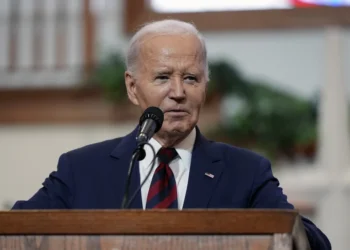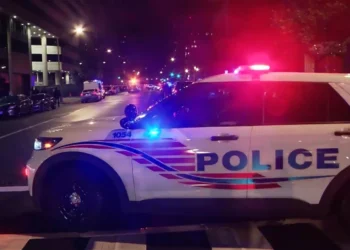On April 2, 2025, a tragic incident at a Frisco, Texas, high school track meet sparked a heated national debate about justice, race, and societal values. Karmelo Anthony, 17, brought a knife to the event, sat under another school’s tent, and fatally stabbed student Austin Metcalf in the heart after a verbal spat turned physical. Anthony fled but later claimed self-defense when caught. Now charged as an adult, the case raises big questions about legal consequences and deeper societal issues.
Anthony is being prosecuted under “concurrent jurisdiction” or “direct file” laws in Texas, which allow prosecutors to charge minors as adults without judicial oversight. This legal framework reflects the severity of the crime and the state’s intent to hold Anthony accountable as an adult. If convicted of first-degree murder, he could face life in prison, potentially with the possibility of parole, depending on the specifics of the sentencing.
Could lesser charges, such as second-degree murder, manslaughter, or aggravated assault, apply? It would require proving that Anthony lacked intent to kill and that his actions were reckless rather than deliberate. However, the circumstances of the case make this unlikely. Anthony brought a knife to the event, issued a verbal challenge to Metcalf, and targeted his heart during the stabbing. These actions suggest intent, undermining claims of recklessness. Had Anthony merely displayed the knife or aimed for a non-lethal area like an arm or leg, a self-defense argument might hold more weight. Yet Texas law requires proportionality in self-defense claims, meaning the response must be proportionate to the threat. Stabbing an unarmed individual who merely touched or grabbed him likely exceeds this threshold, especially since Anthony had opportunities to de-escalate or leave the situation entirely.
The evidence seems to point to a case for first-degree murder, with self-defense being a challenging argument to sustain given the disproportionate use of deadly force.
Beyond the courtroom, the case has sparked outrage and underscored tensions surrounding race, justice, and institutional decisions.
One particularly contentious issue is that Anthony was allowed to graduate from high school despite his expulsion and the gravity of his actions. Anthony’s controversial representative, Dominique Alexander of NGAN, proudly shared the news. “We are proud to share that Karmelo Anthony will graduate and receive his high school diploma, and that his academic achievements will not be disrupted.”
This decision has fueled perceptions that criminal behavior is being rewarded, further deepening the divide in a community grappling with grief and anger. Metcalf’s mother, Meghan, made impassioned pleas to Frisco Independent School District (ISD) to bar Anthony from graduating. On April 17, she sent an email outlining her concerns, followed by another on May 13 when she received no response. A family friend also sent a letter emphasizing the inappropriateness of allowing a student who committed murder to participate in graduation. Despite these efforts, the district announced that Anthony would be permitted to graduate, a decision that stunned many in the community.
The district’s rationale appears to be influenced more by external pressures than by the victim’s family or community sentiment. On April 18, the American Freedmen Legal Fund emailed Frisco ISD, advocating for Anthony’s graduation. On May 13 — the same day as Meghan Metcalf’s follow-up email — the organization posted on social media, reinforcing its stance. “This outcome follows strong community support, public outcry, and legal pressure — including a formal objection from the American Freedmen Legal Fund sent to Frisco ISD challenging the attempt to expel him before any conviction.”
Critics, including local commentator Sarah Fields, have suggested that the district’s decision was swayed by activist groups invoking “social justice” and Diversity, Equity, and Inclusion (DEI) principles. They argue that the district prioritized these considerations over justice for the victim, creating a perception that outcomes are determined by race rather than accountability.
This perception is compounded by the fact that Anthony’s family has raised over $533,000 through a fundraising campaign, with a goal of reaching $600,000. This financial windfall, coupled with the district’s decision, sends a dangerous message: that criminal behavior, particularly in racially charged contexts, may be rewarded rather than punished. They fear this could embolden others to act recklessly, believing their actions will be justified or mitigated by societal or activist support.
The Frisco tragedy is not just a legal case but a flashpoint for broader societal debates. The decision to allow Anthony to graduate, despite his expulsion and the murder charge, could be interpreted as a symptom of a justice system skewed by racial politics. Though DEI policies have been sold as having the goal to address systemic inequities, they are being used to shield individuals from accountability and justice based on their racial identity.
The case also raises questions about the role of schools in addressing criminal behavior. By allowing Anthony to graduate, Frisco ISD may have sought to avoid legal or public relations challenges, but this choice has alienated many who see it as a failure to prioritize the victim’s family, while ignoring the community’s desire for justice.
As Karmelo Anthony awaits trial, the Frisco community and the nation are left to grapple with the fallout. The legal system will determine whether his actions constitute first-degree murder or a lesser charge, but the broader societal questions linger. How do we balance accountability with fairness? Can justice be served when decisions appear influenced by external pressures rather than evidence? And what message does it send when institutions seem to prioritize optics over the pain of victims?
This case underscores the complexities of navigating justice in a polarized society. While Anthony’s fate rests in the hands of the courts, the community’s response — and the national conversation it has sparked — will shape how we address similar tragedies in the future. For now, the memory of Austin Metcalf, who lost his life in a moment of senseless violence, remains a poignant reminder of the stakes involved.

















